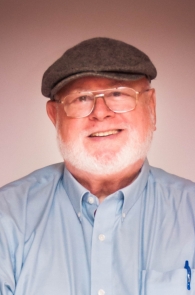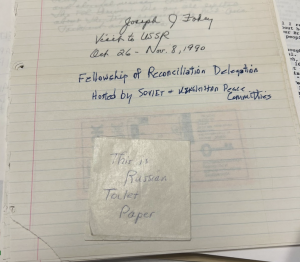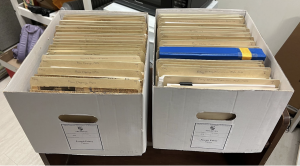Our guest blogger is Elyse Ridder, a graduate student in the joint program for Musicology (MA) and Library & Information Science (MLIS) at the Catholic University of America, and a student employee in the CUA Special Collections.

During my time as a student employee at the Catholic University Special Collections, I have explored a few collections, especially music collections, since that’s my specialty. However, during my Fall 2022 semester, I worked on a collection that was entirely different. Joseph Fahey donated his papers in 2016 and it contains his life’s dedication to peace studies, including his employment at Manhattan College, correspondence with individuals throughout a fifty year period, many peace events he attended, publications, travels, and much more.
Joseph Fahey is a Catholic theologian and peace studies scholar and activist. A graduate of Maryknoll Seminary and New York University, he is a co-founder of Pax Christi, USA and was named a Pax Christi Ambassador of Peace. He is also a co-founder and Chairperson of Catholic Scholars for Worker Justice. A long-time professor at Manhattan College (1966-2016), he created the College’s Peace Studies and Labor Studies programs.
His papers originally arrived in three boxes, and there was no perceived order to how items were organized within the boxes. Papers, documents, letters, etc. were not processed or sorted through. There were notes from previous students that attempted to unbury Fahey’s life work but they were incomplete. I ultimately decided on reordering every single item. I created a three step method to successfully restructure the Fahey Papers. This included: 1) inventorying the entire collection by creating a preliminary box list of every item; 2) reorganizing the collection into appropriate series, subseries, and folders; and 3) composing a finding aid for public accessibility.

As I sifted through letters and documents spanning from the 1960s to 2010s, I started to visualize a way to organize everything. After I finished inventorying, I created a rough skeleton of my arrangement plan. It consists of three series, with distinct characteristics and subseries to find items faster. The first series consists of newspaper clippings, personal documents, photographs, letters, etc. The second series is the largest in the collection and contains five subseries. The subseries includes correspondence, articles, promotional materials, and publications from organizations such as Pax Christi and Manhattan College to Fahey’s travels abroad and published original works. The last series contains correspondence with notable people he met throughout his life, including Pete Seeger, Eileen Egan, and many more.
By creating piles, reordering everything within the boxes to the appropriate series, disposing of duplicates or damaged items (after proper review), creating new folders, and ordering items chronologically, I managed to get Fahey’s collection down from three boxes to two. Lastly, I created a finding aid using EAD after I finished reorganizing the entire collection.

Joseph Fahey had a prolific career and life devoted to peace studies and the betterment of people across the globe. The more I delved into Fahey’s works, the more I wanted to represent his dedication and passion for world peace by ensuring his collection was respectfully and logically organized so it is accessible for everyone for many years to come.
The Joseph Fahey Papers finding aid is available online here.
References
Manhattan College. (2014). Joseph Fahey, PhD. https://web.archive.org/web/20140421082611/http://manhattan.edu/faculty/josephfahey.
